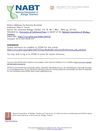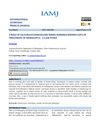 4 citations,
April 2021 in “Experimental and Molecular Medicine”
4 citations,
April 2021 in “Experimental and Molecular Medicine” The conclusion is that certain genetic factors and blood types may affect COVID-19 severity, but changes in ACE2 and TMPRSS2 genes are not clearly linked to it.
 3 citations,
January 2024 in “Materials advances”
3 citations,
January 2024 in “Materials advances” Cellulose nanocrystals are promising for making effective, sustainable sensors for various uses.
 3 citations,
May 2023 in “Frontiers in immunology”
3 citations,
May 2023 in “Frontiers in immunology” Faulty inflammasome activation may lead to autoimmune skin diseases and could be a target for new treatments.
 3 citations,
June 2021 in “Journal of affective disorders”
3 citations,
June 2021 in “Journal of affective disorders” Hair cortisol and cortisone levels may affect how work stress influences depression in Chinese fishermen.
 2 citations,
June 2022 in “Scientific reports”
2 citations,
June 2022 in “Scientific reports” Women with PCOS have higher hair cortisol levels, which are linked to worse metabolic and inflammatory conditions.
 2 citations,
May 2021 in “Scientific Reports”
2 citations,
May 2021 in “Scientific Reports” Stress is likely causing hair loss in Formosan macaques.
 2 citations,
January 2014 in “Elsevier eBooks”
2 citations,
January 2014 in “Elsevier eBooks” The document concludes that reactivation of herpesviruses, especially HHV-6, is linked to severe symptoms and complications in drug-induced hypersensitivity syndrome.
 1 citations,
January 2024 in “Theranostics”
1 citations,
January 2024 in “Theranostics” Exosomes show promise for future tissue regeneration.
 1 citations,
November 2022 in “World Family Medicine Journal /Middle East Journal of Family Medicine”
1 citations,
November 2022 in “World Family Medicine Journal /Middle East Journal of Family Medicine” People in Jeddah know about Vitamin D and its sources but are unclear on how much they need daily, and while many women take supplements, attitudes towards increasing Vitamin D levels vary.
 1 citations,
November 2015 in “Indian Journal of Clinical Biochemistry”
1 citations,
November 2015 in “Indian Journal of Clinical Biochemistry” The conference presented findings on how vitamin D levels, genetic factors, and lifestyle choices like smoking and yoga affect various health conditions and diseases.
 1 citations,
October 2013 in “Our Dermatology Online”
1 citations,
October 2013 in “Our Dermatology Online” 5α reductase type 2 enzyme mutation and oxidative stress may increase androgenetic alopecia risk in Egyptians.
 1 citations,
January 2013 in “Springer eBooks”
1 citations,
January 2013 in “Springer eBooks” Cosmeceuticals may benefit skin health but need more research for efficacy and safety confirmation.
 1 citations,
March 1954 in “Archives of dermatology”
1 citations,
March 1954 in “Archives of dermatology” Animal research has greatly advanced dermatology.
 February 2024 in “Journal of Education, Health and Sport”
February 2024 in “Journal of Education, Health and Sport” Exosomes can help repair and heal tissues, improving health and vitality.
 February 2024 in “medRxiv (Cold Spring Harbor Laboratory)”
February 2024 in “medRxiv (Cold Spring Harbor Laboratory)” The study aims to understand how mood, physical activity, light exposure, and seasonal changes affect sleep patterns.
 January 2024 in “Diabetes & metabolism journal”
January 2024 in “Diabetes & metabolism journal” Disrupting natural body clocks increases the risk of developing type 2 diabetes.
 January 2024 in “Burns and trauma”
January 2024 in “Burns and trauma” The skin microbiome helps heal wounds and can be targeted to improve healing.
 December 2023 in “Frontiers in endocrinology”
December 2023 in “Frontiers in endocrinology” Excess androgens may cause PCOS, not just be a symptom.
 October 2023 in “Journal of health sciences and medicine :”
October 2023 in “Journal of health sciences and medicine :” Patients on long-term hemodialysis often have skin problems related to their treatment.
 March 2023 in “Seminars in reproductive medicine”
March 2023 in “Seminars in reproductive medicine” PCOS often leads to sleep problems, especially obstructive sleep apnea, affecting overall health.
 December 2022 in “Exploratory animal and medical research”
December 2022 in “Exploratory animal and medical research” The study concluded that Acral lick dermatitis is most common in young male Labrador retrievers, often caused by psychological factors, and leads to skin inflammation and stress-related blood changes.

L-PGDS has specific binding sites for its functions and could help in drug delivery system design.
 January 2017 in “Springer eBooks”
January 2017 in “Springer eBooks” The document explains various skin conditions and their treatments.
 January 2015 in “Indian Journal of Medical Biochemistry”
January 2015 in “Indian Journal of Medical Biochemistry” Men with early balding should be checked for metabolic syndrome, as there's a link between the two.
 January 2011 in “Side effects of drugs annual”
January 2011 in “Side effects of drugs annual” Tretinoin gel is safe for sun exposure, but tacalcitol doesn't significantly improve non-segmental vitiligo.
 November 1983 in “American Biology Teacher”
November 1983 in “American Biology Teacher” Pattern baldness is likely caused by a dominant gene influenced by testosterone levels, making it more common in men.
 January 2024 in “International Research Journal of Ayurveda & Yoga”
January 2024 in “International Research Journal of Ayurveda & Yoga” Ayurvedic treatments can effectively regrow hair in alopecia areata.
 October 2023 in “International journal of science and research”
October 2023 in “International journal of science and research” Ayurvedic treatments can effectively regrow hair in Alopecia Areata without side effects.
 June 2021 in “International Ayurvedic Medical Journal”
June 2021 in “International Ayurvedic Medical Journal” Ayurvedic treatments like leech therapy and turmeric-neem paste can effectively treat alopecia areata without harmful side effects.
 May 1993 in “Current problems in dermatology”
May 1993 in “Current problems in dermatology” Skin symptoms are important for diagnosing infections in children.






























